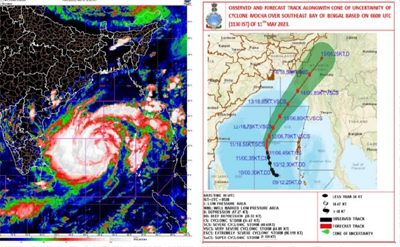The Indian state of Tripura has been experiencing a prolonged period of high temperatures and humidity, which has made life difficult for many people. However, relief is in sight, as the Indian Meteorological Department has predicted heavy rainfall in the state from May 13th for at least three days.
The reason for this change in weather is a cyclonic storm called “Mocha,” which has been moving north-northwest over the southeast Bay of Bengal at a speed of 8 km per hour. As of May 11th, it is located near latitude 11.6°N and longitude 88.0°E, about 510 km west-southwest of Port Blair, 1160 km south-southwest of Cox’s Bazar (Bangladesh), and 1080 km south-southwest of Sittwe (Myanmar).
According to the IMD report, the cyclonic storm is likely to intensify into a severe cyclonic storm on the night of May 11th and further into a very severe cyclonic storm on May 12th evening over central Bay of Bengal. It is expected to reach its peak intensity on May 14th evening with maximum sustained wind speed of 140-150 kilometres per hour. The storm is likely to cross southeast Bangladesh and north Myanmar coasts between Cox’s Bazar (Bangladesh) and Kyaukpyu (Myanmar), close to Sittwe (Myanmar), around noon on May 15th.
While the heavy rainfall may provide relief from the heat, it could also lead to flooding and other problems. Therefore, people in Tripura and surrounding areas should take necessary precautions to stay safe during this time.
The article highlights the severity of the heatwave that has affected Tripura for over two weeks. The capital city, Agartala, recorded a maximum temperature of 39.8 degrees Celsius on May 10th, which is the highest in the month of May after 44 years. The city also registered a minimum temperature of 26.7 degrees Celsius, which is 6.6 degrees Celsius above normal.
The article notes that the state had witnessed temperatures of 39 degrees Celsius and above in mid-April, after a gap of nine years. The long dry weather has resulted in water sources drying up, leading to a drinking water crisis in hilly, remote rural areas. People have been protesting on the streets, seeking water.
The article highlights the importance of preparing for extreme weather events, such as cyclonic storms, and taking necessary precautions to stay safe. This includes staying informed about weather forecasts and warnings, securing homes and belongings, and following the advice of local authorities.
The emphasizes is on the need for people to be prepared for extreme weather events and take necessary precautions to stay safe. While the heavy rainfall may provide relief from the heatwave in Tripura, it could also lead to flooding and other problems. Therefore, it is important to stay informed and follow the advice of local authorities.

